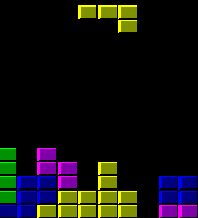 |
|||||||||||
|
Modeling Tetris Cognition
 |
|
|
|
Our research aimed to expand our knowledge of how people unconsciously compensate for cognitive limitations in memory, planning and attention, particularly as they age. We had three objectives:
- to understand some of the mechanisms people have for adapting the environment to improve their performance
- to discover how pervasive fast-paced cognitive compensations are
- to understand the effect which `cognitive slowing' has on different cognitive architectures
To investigate mechanisms for adapting the environment we utilized several studies to examine strategies used to cope with problems posed by certain everyday contexts such as counting coins, playing cards and completing simple assembly tasks.
To investigate how pervasive fast-paced cognitive compensations are we used the computer game Tetris as an empirical testbed to observe performance of subjects over 20-30 hours of play to determine how much of their improvement can be explained in terms of compensations. Tetris is a fast-paced, challenging computer game which requires between 15 and 30 hours to become highly skilled. Although it is a constrained environment in which players have only four motor actions available, all players nonetheless evolve a host of interesting environmental strategies for improving play.
To investigate the effect of `cognitive slowing' on different cognitive architectures we built three different computational models of the complex system of perception-decision-action cycle that is learned when people play Tetris. Depending on whether expertise lies more in case knowledge (learning by experience about the solutions which work), in a rule-base (developing rules for how to react to various situations), or in some set of tuned perceptual abilities (having better mental/perceptual representations of situations), we would expect diminishing capacities to show up in different ways in performance and to have a more or less severe impact on overall expertise. To obtain the data required for a detailed comparison of computer and human model we constructed a Tetris environment that records the timing of actions at the millisecond level and also records the details of the arrangement on the board and of piece behavior. We then compared the predictions our different computer models of expertise to the empirical results we obtain from millisecond observation of subjects playing Tetris for 20-30 hours.
|
|



